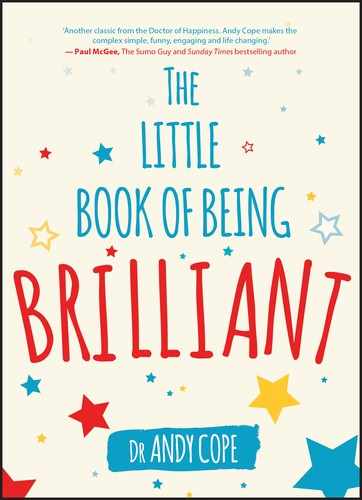Part 1
WELCOME TO THE PLEASURE DOME

Welcome. Is it okay if I admit to being a teensy bit nervous? Part 1 begins gently enough with how NOT to write a book, whether to align myself with Bowie or Kajagoogoo, and the likening of life to a charity jigsaw. Then there’s some heavy breathing and no breathing while we contemplate the brevity of life and the eternity of death. We begin to understand about Mondays and Fridays and I have a stab at writing the shortest personal development book the world has ever seen, a snappy two-pager. You might be able to call it a day after that? But I recommend you hang in there while we get lubed up for lashings of S&M, with a nice cup of tea and slice of cake afterwards. Animals feature quite heavily in this opening salvo. Frogs; do you prefer them fried or boiled? There are three apocalyptic horses, an exhausted coyote, captive dolphin, golden goose, and lots of excellent sheep. Oh, and a kangaroo. We learn why a bank robber smeared lemon juice on his face, alongside a whole load of other interesting facts that don’t make it into this book. That sentence doesn’t stack up but not to worry, the whole thing is deliberately crafted to have an air of je ne sais quoi, a whiff of the unusual, a stench of something being ‘not quite right’. Part 1 is a rip-roaring tour through modernity that smacks you round the face with several realizations designed to gain me some ‘idiosyncrasy credits’. It’s an awakening. Hello. Helloooooo! WAKEY WAKEY! The best way to make your dreams come true is to wake up. Life’s for living, so let’s crack on … In true Sesame Street tradition, each section of the book is brought to you in association with a new word. Part 1 is sponsored by the word Sólarfrí. Icelandic / n. / səʊ.lɑːfriː /
soh-lah-free. A sun holiday, i.e. when workers are granted unexpected time off to enjoy a particularly sunny/warm day.
Enough Already!
Have you ever tried to write a book? For the uninitiated (and I appreciate this might just be me) it doesn’t start with pen, paper, or laptop. It kicks off with cleaning my fridge out. Nine times. Then you spend some time alphabetizing your CD collection and sorting your spice rack. Then you open your laptop and some emails have pinged in. Well they’ll need answering, rude not to. Then you’ll have your usual webpages and social media accounts to check out. I’ll generally bleach the toilet and then stick the kettle on because I can’t write without coffee.
Back to my desk and a few more emails have popped in – gosh I’m soooo popular – and someone’s retweeted a couple of my tweets. I have to return the compliment, obviously!
Then I decide to change the CD system. It’s been niggling me. I’m overloaded with Ts, because foolishly I’ve put The Clash, The Ramones, The Carpenters, The Who, and all the other ‘The’ bands under ‘T’. Schoolboy error. With ‘The Clash’ now safely categorized alongside Chopin, I sit down at my laptop, crack my fingers and knuckles, take a deep breath, and decide it’s time for a sandwich.
We all know Jesus was a carpenter but he never actually sang on any of their records.
Mark Walker
And so to business.
Welcome to book 11. Yes, eleven! I’m counting them on my toes.
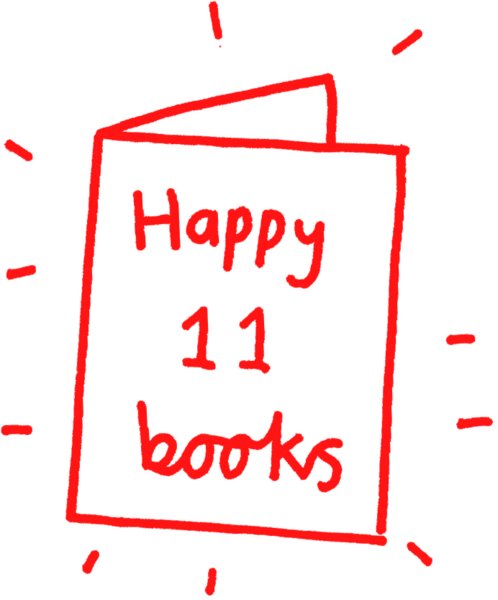
Double figures feels like an anniversary. A time to look back and reflect.
You might be such a loyal follower that you’ve read and absorbed all eleven. In which case, I salute you. A warrior of personal development. You’ve read them on the beaches. You’ve read them in the hills. You’ve never surrendered. You’ve been with me through the mud and bullets.
Or you might have casually picked this book up at the airport and are wondering who the heck I am?
I’ve written this book for both sets of readers. After 11 albums, David Bowie was allowed a Greatest Hits compilation. Ditto Fleetwood Mac, Abba, and Bon Jovi. I think Kajagoogoo had a greatest hits album too?
Anything Kajagoogoo can do I can do too.
Isn’t it about time I stopped being too shy shy and compiled the last 10 years of writing into one simple tome? Whether you deem it to be a timeless classic or pop fluff, I’ve delegated that judgement to you.
With that burden lifted from my shoulders I’m free to crack on with track 1 which is, I believe, something of a wedding playlist containing, as it does, something old, new, and borrowed.
But first, something blue.
Check the book charts and you’ll notice a pattern to the current crop of bestsellers. As a result, I toyed with calling book 11 ‘The little book of being TOTALLY FUCKING brilliant’.
Thankfully, I’m not that desperate for a number 1 hit. Yes, some naughty words might creep in, but not emblazoned on the cover where the kids can see them. I’m not a monster.
Here’s a beautiful non-naughty new word for you: Sonder. You know that craziness in your head, the whirring of thoughts and insecurities? Sonder is the realization that each random passer-by is living a life as vivid and complex as your own – populated with their own ambitions, dreams, routines, worries, and inherited craziness. Sonder hints that the inner dialogue always veers towards the negative and it ain’t half shouty.
But it’s not just you! Sonder applies to the human race. Yes, everyone else is insecure too, even the ones who seem to have their shit totally together. They actually haven’t! They’re filled with self-doubt and the same negative shouty voice, so chill, we’re all a little bit crazy and a whole lot insecure.
Sonder means you and I are alike. It’s easy to become addicted to the endless cycle of lack, an emptiness, a feeling that there should be something more. Your life feels like the second-hand jigsaw you bought from a car boot sale – you don’t rejoice that there are 497 jigsaw pieces, you fret at the missing 3.
We’re all gripped with a nagging feeling that something’s missing. Your je ne sais quoi. Death is coming, life is relentless, what on earth are we to do?
Chaos is the new normal. I used to feel like one of those cartoony figures that’s just run through a wall, leaving a massive Andy-shaped hole. I set out to fill the hole with wi-fi, money, midnight snacks, work, and general busyness. Rather than create gaps in my diary I was always looking to fill them because … well because that’s what everyone else was doing.

If life failed to deliver I pulled my socks up and chased harder. If you’d freeze-framed my fellow commuters and work colleagues it’s as though we were in a self-administered formaldehyde, permanently and perfectly suspended in a state of doing, exhaustion, and angst.
Applied to you, let’s look back over the last 20 years of your life. Twenty years ago, you wanted more money and a better job. You got them. Tick.
You wanted a decent car. With cup holders and a secret sunglasses compartment. Tick.
You wanted kids. Better than average ones and BOOM, here they are, the apples of your eye (or the sties of your eye, who knows?). Tick.
You wanted a nice place to live, with decent furniture and cupboards full of clothes. Check your wardrobe and count how many pairs of shoes you have and hey presto, tick, tick, tick – your wishes have been granted.
You’ve been blessed by the ‘enoughness fairy’. In fact life has provided riches beyond your wildest dreams of 20 years ago. You’re drowning in glut.
The question is, are you any happier?
Which brings me on to the question that launched my research, a notion that swirled around for a while before I dared ask anyone else. Could you be happier even if nothing in the world around you changed?
The answer in my own head was a resounding ‘yes’ which was an admission that the world didn’t need to change around me. Indeed, the world wasn’t going to change to accommodate me (the world is as it is, more of that later) but I actually had untapped happiness within. I had the potential to be happier but I wasn’t being. My happiness was like one of those gushing oil wells, but firmly capped.
By me!
It was puzzling. Maybe I was unusual? While the rest of the human race wandered the planet bigging themselves up and congratulating themselves on how fabulous they are, I was the one in seven billion weirdo giving himself a right mental kicking.
But then I remembered Sonder. The craziness. The whirring thoughts. The inherent human condition.
So a few weeks later I was doing a keynote and I dared to ask the audience the same question: Could you be happier even if nothing in the world around you changed? There was a murmuring and then about 290 of the 300 hands raised, puzzled expressions etched. They too had never considered it before. In terms of happiness I wasn’t alone. It seemed that human beings are standing in their own way.
But why?
And, more importantly, how can we learn to step aside and let the sunshine in?
For me, the starting point is a little darker. I was always told that death and taxes were inevitable and then I discovered that the uber rich have off-shore trusts in Panama.
So it’s just death then.
Conversation in Hitchhiker’s Guide to the Galaxy between Arthur Dent and Marvin the Paranoid Android:
- Arthur:
- ‘Marvin, any ideas?’
- Marvin:
- ‘I have a million ideas. They all point to certain death.’
We’re all familiar with ‘presenteeism’ at work, that feeling of turning up and going through the motions. But it’s a much bigger concept than work. Presenteeism can apply to life. You’re centre-stage, the leading player in your own life, but struggling to engage with the plot.
There’s a creepy line of dialogue in the movie The Sixth Sense where the haunted young boy tells Bruce Willis, ‘I see dead people.’ I think I have a similar ‘gift’, except that the people aren’t physically dead, they’re those living a near-life experience, thousands of them going about their lives in a zombie-like trance of mediocrity. Technically, they are alive. There’s a pulse. But not much else.

So, before I hit you with a barrage of philosophy and ‘ologies’, let me start where I always bloody well start, with Stephen Covey’s ‘begin with the end in mind’. If I’m talking to a room full of children and I announce that the average lifespan is 4000 weeks I’m treated as some sort of demi-God. There’s a lot of jumping and cheering – ‘Woo-hoo, thanks for telling us, Andy. That’s like … forevs!’
The same fact shared with a corporate audience and I’m the anti-Christ, pelted with soft fruit. The childlike woo-hoo becomes an adult boo-hoo. Sometimes people will vocally disagree. ‘That can’t be right’, they say, tapping some numbers into their smartphone, discovering not only that it’s true but also sobering. Gulp! 4000 weeks is not a very big number. And I’ve used a few!
‘I’m normally not a praying man, but if you’re up there, please save me Superman.’
Homer Simpson
If your goal is perfect peace, I think you might have to wait until your 4000 weeks have been consumed. It’s like a Premiership game – eventually someone will hold a board up with your number on – human being number 7,455,632,001 – shit, that’s me! The gaffer’s decided I’ve had enough. You trudge off the game of life to warm applause and someone takes your place, a fresher pair of legs.
You can enjoy your bath in perfect peace. Eternal soulful peace, hopefully.
But if you want a quieter mind and more fulfilling earthly existence, you’ve got your nose in the right book.
Sonder; the yearning, the inner agitation of ‘is this it?’, it’s there for a reason. It’s trying to lead you somewhere.
It boils down to this: if there’s something missing in your life, it’s most probably you.
Welcome home.
Begin with the End in Mind
In the interests of life being a short and precious gift, I thought I’d throw this one at you:
Richard’s nickname was dig bick
You that read wrong!
You read that wrong too!1
Apologies if it caught you out. It means you’re skimming the surface of this book, hoping to speed read your way to enlightenment. I understand your impatience. I don’t want to twist the knife any more than I have to but there’s a good chance you’re skimming the surface of life too. You’ve become what human beings are – a race – a seething mass of seven billion runners competing in a 4000-week sprint.
Modern life is hectic and full on. I recently had an exasperated delegate on one of my workshops who huffed and puffed that ‘I haven’t got time to be happy!’
‘I went to a bookstore and asked the saleswoman, ‘Where’s the self-help section?’ She said if she told me, it would defeat the purpose.’
George Carlin
Happiness doesn’t require time, it requires insight. It might require a refocusing away from your to-do list towards your to-be list, because ‘who are you being while you’re doing the things on your list’ requires you to point the finger back at yourself and ask some searching questions. There’s a degree of honesty involved too. Are you being full of optimism, happiness, hope, energy, positivity, enthusiasm, and vivacity? Or are you being like everyone else, who pretty much isn’t?
Society is experiencing a massive ‘wait problem’. The mantra, insidiously seeping into you from a very early age, is that Mondays are bad and Fridays are good. Oh, and Wednesdays aren’t too bad because it’s all downhill from there. Once that way of thinking is firmly lodged in your head, it’s difficult to get it out again. You become that person. You slouch on Mondays and skip on Fridays. You’re waiting for life’s happy hour.
But here’s where it gets really spooky because nobody sat you down and taught you that Mondays are rubbish and Fridays awesome.

When I was four my dad never sat me down for a chat and said, ‘Look here little Andy, there’s some stuff you need to know about life, so I’m going to tell you straight.’
‘What is it Dad?’ I ask adoringly. In my eyes, age four, my dad is God.
‘Well son, first of all you need to know that Mondays are bad. I mean really stinky. And Tuesdays aren’t much better. Wednesdays pick up a bit but they’re still a bit pants. Thursdays are a bit better then you can come alive on a Friday.’ He swells his chest as he recalls that Friday feeling. ‘Yes indeedy. Fridays are good because Saturday comes next and let me tell you son, Saturday is the best day of the week by far. You can proper enjoy Saturdays.’ He pauses, breathing in the intoxication of Saturday and then exhaling as he considers how he’s going to explain Sunday to his 4-year-old. ‘Sundays, well they’re okay ‘till about 4 o’clock and then you start to get depressed again because Monday comes next.’
I’m nodding, taking it all in. Dads never tell fibs.
‘And son, you’re gonna do that 4000 times and then you’ll die.’
I don’t know about you but that conversation never actually took place in my house. It didn’t need to. The fact that my dad slouched out of the house on Monday and kangarooed in on Friday was clear enough.
That’s how I learned. And me and thee are the same. Human beings have an in-built social satnav that has a magnetic gregarious pull towards other people. There are social rules that we need to abide by if we want to be part of a tribe, clan, team, or family. And this social magnetism pulls us into strict conformity.
In the olden days, being excluded from your tribe was effectively a death sentence and the new world equivalent, being unfriended on Twitter, hurts like hell too. Because being part of something social plays such an important part in your well-being you end up falling into line.
If you buck the trend by leaping into the office on a Monday with a hearty cry of ‘Don’t those weekends drag …’ then the chances are, you won’t have any friends, either on Facebook or anywhere else.

So, the majority of the population learn the behavioural ropes and go about their hectic lives, fitting in as best they can. As William Deresiewicz rightly points out, we become the world’s most excellent sheep.2
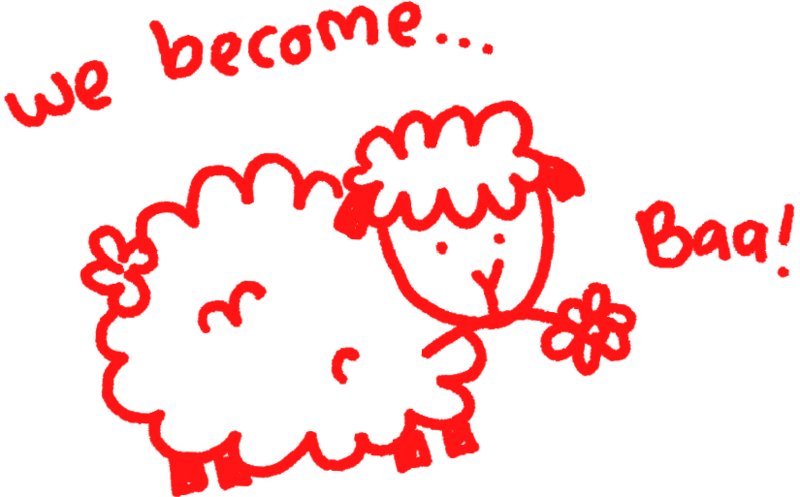
So, unless you’re incredibly enlightened, this is how life plays out. You have a vague idea of what you want; more money and recognition maybe? Less stress perhaps? Or a nice holiday where you can relax and recharge your batteries. You want to be purged of ‘minor glumness’, that feeling that sits in the pit of your stomach when the alarm goes off at stupid o’clock on a work day. It’s akin to Phyllis Diller’s ‘morning sickness’ – she wasn’t pregnant, just sick of mornings!
Sound familiar?
Baa-aa.
The Shortest Book in the World
‘We live in an uncaring society. I was in the park the other day watching an old man feed the birds, and after a while I thought to myself: I wonder how long he’s been dead?’
Milton Jones
Muhammad Ali holds the world record for the shortest poem ever, a pithy two-worder that he made up on live TV, which goes like this;
Me. We.
I like it because it points towards human connection, introspection, ‘outro-spection’ – and because it rhymes, like poems bloody well should. But mostly I like it because it’s short.
Imagining that you’re pushed for time I was tempted to take a leaf from the pugilistic wordsmith and make this the shortest personal development book ever. If I was to take the money and run and we could be done in a couple of pages.
I’d have called it The Cheat’s Guide to Awesomeness and the double-pager would be this:
Hello.
We hear a lot about fake news. Here’s the real news which, to be fair, you’ll be wishing was fake news. It comes in two dollops; bad, and then reaaaaally bad.
The bad news is that you’re going to die.
The really upsetting bit is that so is everyone else.
I suspect that death itself isn’t the problem. It might be a bit scary, all that ‘not breathing’, and as you’re drawing your last breath there will be the worry of whether you’ve left the gas on and who will feed the cat.
But it’s not death that’s the source of our mortal teeth gnashing, rather the fear that we might not have lived quite the joyous and fun-filled life that we might have.
Four thousand earthly weeks of mediocrity is such a terrible waste of time!
Fact #1: the world isn’t going to bend to accommodate your wishes. If your happiness is contingent on the arrival of the perfect political party, cloudless azure skies, the elimination of pot holes, and cheap trains that run on time, you’ll die waiting.
Fact #2: the biggest obstacle to your awesomeness is yourself.
Now you know what the problem is, the even better news is that, with laser precision, you already have the answers. You already know how to improve your state of well-being. Don’t believe me? Try this:
List three things you can do, starting today and doing them every day, that will seriously improve your life:
Remember, I’m aiming to write the shortest personal development book in the world, a two-page wonder. You have identified the problem and come up with three easy-peasy solutions but we still haven’t filled the two pages. So, as a filler, let’s throw in the opposite question:
List three things you can stop doing, or do less of every day, that will seriously improve your life:
Please go and do the things you said would help and stop doing the things that are harming your well-being.
Thank you for reading The Cheat’s Guide to Awesomeness. Enjoy the rest of your fabulous life.The end.
This glorious piss-take is frustrating as hell because you know it’s true. Or half true, at least.
There’s a difference between ‘knowing’ and ‘doing’, hence the rest of this book. You need knowledge. You need confidence to experiment. You need the motivation to change but most of all you need some hand-holding, coaxing, scaring perhaps? (hence the death stuff)
I spend a lot of time in organizations trying to fix people and teams who have had some vastly overcomplicated restructure or culture change initiative that hasn’t worked. Getting rid of people is harsh enough but the modern game is to make it even more cruel by asking people to re-apply for their own jobs, like some kind of organizational musical chairs. The rules are simple enough: when the music stops, two of you will have had your desks cleared and there’ll be nowhere for you to sit.
Smile now (through gritted teeth, obviously) as Black Lace’s Superman blares out …
The music stops when you’re mid ‘macho-manning’, there’s a mad scramble for chairs, a couple of players leave the game, and the remaining ones have to graft harder to cover the players who are out.
The music cranks up again …
Enough!
Let’s quit playing the same game as everyone else. It’s about time you took charge of the music and danced to your own tune.
Lubed Up and Ready for Action
Solutions? They come later. First let’s have a sneaky peek behind the curtains of modernity. If we can catch sight of the problems, we stand a better chance of finding a way forward.
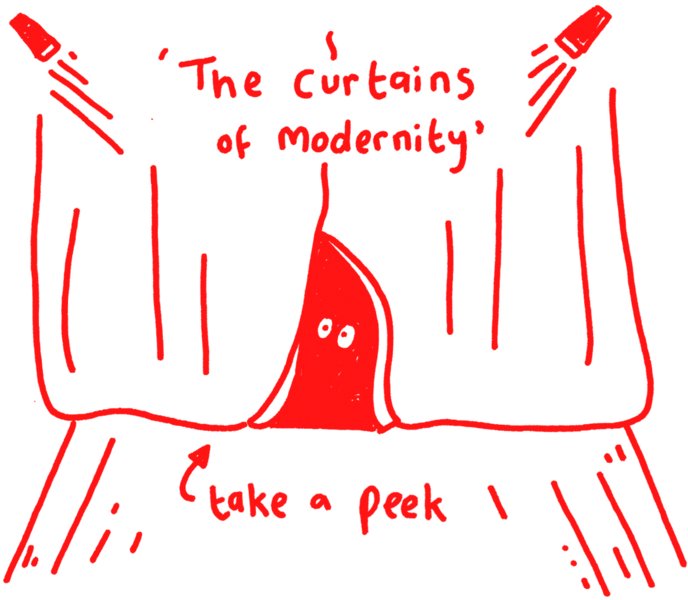
Congratulations on your membership of the most exclusive club ever. In fact the first of its kind in human history, and you’re a gold member. The elite. You are a member of the most in-debt, medicated, obese adults in the history of the human race.
The world has always been a dangerous place. The terror used to come from scarcity – not enough food, clean water, warmth, or medicine. The lack of pretty much everything meant that if you reached 40, you were living a charmed existence. We tend to forget that since Homo sapiens were invented we’ve been eking out an existence, surviving from day to day, season to season. A bad crop and the village is wiped out. Appendicitis meant curtains. A dodgy water supply meant dysentery and death by diarrhoea. That’s a really shitty way to go.
The world is still dangerous, but the terror pendulum has swung from extreme lack to gratuitous excess. Too much food, drink, and medication. We’re dying of ailments caused by excess. Obesity, type 2 diabetes, heart attacks, alcoholism, stress, addictions; the modern world is killing us. It’s not appendicitis that finishes you, it’s the addiction to your prescribed painkillers.
‘I always take life with a pinch of salt. Plus a slice of lemon, and a shot of tequila.’
Unknown
The game-changer is to grasp the slippery WWF wrestler that is ‘happiness’ and pin it down long enough to get a real good look into the whites of its eyes. If you’re lucky, you’ll see it. There’s much more of this later in the book but for now you need to know that happiness is created from the inside. All the feelings you’ve ever experienced have been manufactured from within. That means everything is reversed. It gets a bit weird. The things that you thought made you happy – they actually don’t.
Your pizza has lashings of mozzarella and pepperoni, but no actual happiness, not in the dough or the topping. Same with cake, your new car, phone upgrade, and number of social media followers.
Happiness is not some secret ingredient that exists in the outside world. You don’t have to sit on a gluten-free cushion to feel good. Happiness is not an actual ‘thing’, you can’t put it into a wheelbarrow, it’s created entirely in your thoughts.
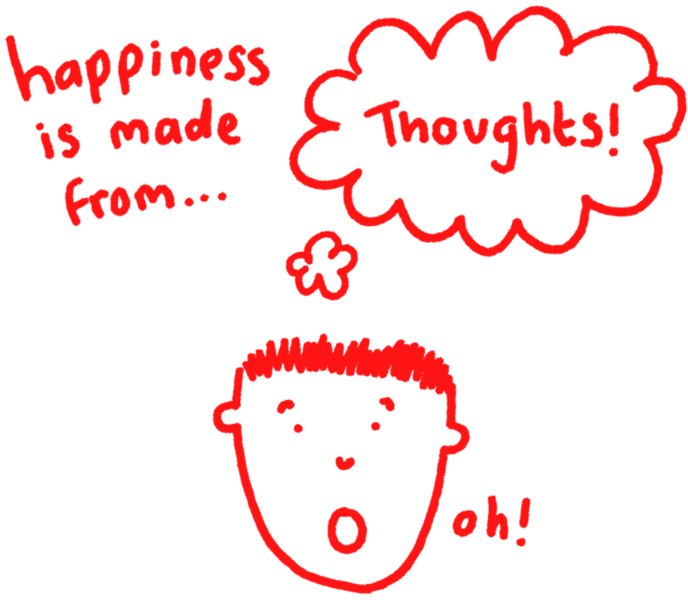
Then, just as you think you’ve grasped it, happiness has oiled itself up and wriggled away again. You feel as though you nearly got it but the slipperiest of concepts is gone, taunting you from somewhere over there. ‘Come and get me baby.’
What’s a happiness researcher to do other than roll up his sleeves and continue the stalking process?
Of course, most people aren’t happiness researchers. They’re normal people. The slippery customer that is an oiled-up WWF wrestler is but a figment of my imagination, dreamed into existence to make the point of elusiveness. The vast majority of people go about their day-to-day business without any of this crossing their minds. I think it’s called ignorant bliss. Indeed, ignorance of ignorance must be the key to total bliss!
And that, right there, is pretty much the exact problem. It’s not the slippery nature of what I’m trying to say, it’s the fact that almost nobody ever tries to figure it out. Do you ever catch yourself thinking about thinking, reality, happiness, and the fact that we might actually be living in a Matrix-style self-generated parallel universe? That we’re made up of molecules that are aware of molecules?
Of course you bloody well don’t!
You’ve not got time for one thing, what with the modern hurly-burly of life. And when you do get a moment to think, it’s thinking what you’re going to do next. And then after that.
Hence the vast majority of people live their entire lives in the mistaken belief that the external world is making them feel the way they do.
Hedonism is the posh term for instant happiness, the quick fixes of chocolate, sex, alcohol, shopping, fast food, a line of coke, an armful of heroin, a lungful of crack – cram those into a night out and you’ll be overflowing with joy. The problem with instant happiness is that you might be struggling for joy the next day. Over-consumption of things that bring instant joy will in fact bring long-term unhappiness. Ask someone sleeping in a shop doorway how their heroin happiness habit is going and you’ll see the same pain in their eyes that is etched into their veins.
It’s sometimes referred to as the hedonic treadmill – the relentless and never-ending pursuit of more. Just like a normal treadmill, it’ll exhaust you. Indeed, too much instant happiness can kill you.
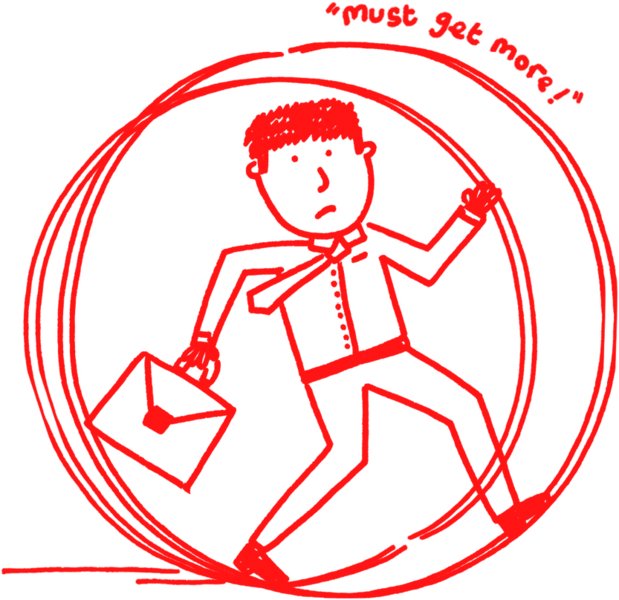
The Greeks came up with an alternative concept of happiness, ‘eudaimonia’, a complicated sounding word that more or less translates as ‘the good life’ in which we mix pleasure with purpose and meaning. Living the good life means knowing when to stop. It means saying no to some of the hedonistic urges, forgoing instant happiness in favour of long-term pleasure.
Hedonism versus eudaimonia has been a philosophical debate raging through the ages. Aristotle had a go, and Gandhi. I can’t match their eloquence so here it is in Andy language:
Hedonism (instant happiness) is lashings of cake and sado-masochistic sex at the same time (‘lashings’, see what I did there?).
Eudaimonia (a good life) is S&M but with comfy handcuffs and a slice of cake afterwards.
Or, said in a slightly different way: in the long run, a deep and loving relationship will make you happier than a frenzied orgy.
There you go. That’s pretty much what Gandhi meant to say. Maybe? Or when you stop chasing the wrong things you give the right things a chance to catch you.
Amen.
You Want Fries With That?
Ever fancied boiled frog? Kermit and fries? Me neither.
So here’s an experiment NOT to try at home. Apparently, if you pop a frog into a pan of boiling water it will, not unsurprisingly, leap straight out. Hopping mad, I would imagine (sorry).
But if you place said frog in a pan of cold water and gradually heat it up, the frog will not jump out. Kermit will, in fact, boil to death.
Odd that.
I adore the modern world. We can send people into space. We can split atoms. We’ve created cat food that comes in individual gourmet sachets. We can cure diseases and replace worn out body parts. Messrs ‘Wi’ and ‘Fi’ have teamed up to invent invisible magical beams of stuff and Samuel Sung churns out handheld devices that tune into that invisible jiggery-pokery allowing you to access all the information in the world. And who knows, one day in the future, maybe it’s not totally beyond the wit of someone to invent screens for those devices that don’t actually smash.
My point? The modern world, generally speaking, is a wonderful place. If I had to pick any time or place to be born from the whole of history, it would be Derbyshire, today.
However …
The world has gradually been gathering pace. Not literally. If you observed our solar system from afar, our bluey-green rock is hurtling around the sun at a steady 67,000 mph, suspended in our galaxy which is, itself, moving at 1.3 million mph.
But that’s nothing compared to the speed of human life. If you zoom in, society has speeded up. It’s changed rapidly and seismically. Life, for the majority, is full on.
The norm is no longer the norm. There are lots of Kermits, boiling to death.
I don’t feel old but I must be. I’m not old old. I’m old enough for nose and ear hairs to be a problem but not old enough to stop caring about them, but I am old enough to remember the 1970s and 80s, hence this book is peppered with references that millennials might not get.
Adults are very ‘knowing’. All older generations, ever, have looked at the modern crop of youngsters and tutted. Let me give you an example. I deliver in schools and was recently working with some 14-year-olds in Warrington. Sixty in the group. Great kids. At breaktime every single one was on their phone. I’m talking EVERY SINGLE child. For EVERY SINGLE minute of breaktime. They were swapping clips, Instagramming, WhatsApping, texting, looking at videos of cats. It wasn’t silent. They were chatting and giggling, whilst all the time looking at their screens. The lack of eye contact was a bit eerie. Because I’m 51. It’s hard not to tut. I know better. I wouldn’t do that.
But, of course, I absolutely would. If I was 14, I’d be doing exactly the same. What am I going to be, the one kid who sits there trying to make eye contact and chat about the social injustices implied in Orwell’s Animal Farm? If so, I’m going to get bullied. To be fair, it’ll probably be online and if I’m the only kid not online then I’ll never know. Because, in the modern world even bullying has moved to cyberspace. Kids don’t stand toe to toe and punch seven bells out of each other anymore, while their peers gather and chant, baying for blood.
Nope. Blood-wise, it’s a lot cleaner. They beat seven bells out of them on social media and while in the olden days your bloody nose and black eye would heal, the mental wounds of modern day bullying will stick around a lot longer. Whoever said ‘sticks and stones will break my bones but words will never hurt me’ clearly had no access to Facebook, Twitter, or Snapchat.
‘Nostalgia isn’t what it used to be.’
Ashleigh Brilliant (among others)
My teenage son actually watches YouTube videos of people playing computer games. It seems odd to me, although clearly not to him, that he’d prefer to watch others playing rather than play himself.
Hang in there while I make a terrifying leap to loving relationships and sex. There are an increasing number of men who have become immune to loving relationships. It’s dysfunctional. Erectilely so. They’ve watched so many extreme acts that when they’re actually centre stage with a real person it’s lights, camera, but no action.
Are we consuming so much pornography that real flesh-on-flesh lovemaking is somehow less appealing? I don’t know the answer, nobody does. Yet. I’m just daring to pose the question.
So as an ‘old’ person I can tut at the modern generation and their smartphone addiction all I like. It’s what kids do. If I was them I would be doing it too. It’s no good telling me to be different. You do what your peers do. End of!
Except it’s not just kids, is it? Research out this very day suggests that adults check their phone every 18 minutes and within two minutes of waking up. And at night time when you’re tucked up beside the love of your life, you’re not sneaking your hand up their jimjams, you’re stealing a sneaky peak at your emails and sending the world a goodnight tweet. #FFS
Three Horsemen and a Roadrunner
I used to love Looney Tunes’ classic Roadrunner cartoons. Wile E. Coyote was so desperate to catch the fleet-footed bird that he’d do almost anything – magnets, bombs, nets, boulders rolled down hills – he was a very creative hound. In one episode he took delivery of an Acme robot roadrunner, a sexy female one with big eyelashes, in an attempt to lure his intended lunchtime snack into a trap. Epic failure.
But the all-time classic episode is where the desperate dog straps himself to a giant rocket, waits for the Roadrunner to meep-meep past, fixes his goggles into place, lights the fuse and whooooosh! He catches up until he’s actually flying alongside the elusive bird. He can sniff his lunch … then as the bird follows a bend in the road the rocket goes straight ahead, over a cliff. The rocket splutters to a halt and Wile E. looks bloodshot-eyed to camera, suspended in thin air before animated gravity takes hold.
The classic cartoonery is aped in real life, except I doubt that very many people feel like the Roadrunner, speeding ahead, obliviously carefree and unaware of the traps along the way. Most of us can easily identify as the weary coyote, trying everything, even stupid tactics, that we hope will get us ahead. That momentary realization – the bloodshot eyes to camera look as another week slips by in near-exhaustion – we wear that look well.
But a lazy Wiki search throws up an interesting fact; coyotes are actually faster than roadrunners. So all those rockets, nets, bombs, and magnets weren’t needed. All Wile E. Coyote needed to do was run. No need for bloodshot eyes, being impaled into the side of a mountain, or falling off a cliff. The solution was the most obvious thing in the world. That crazy coyote had gone and done what all of us do every single day – he’d overcomplicated things.
He’d accidentally become his own worst enemy.
As have we. In a brutal re-enactment of a Wild West scene, we’re on the end of a rope being dragged through town by the three horsemen of the modern mental illness apocalypse: busyness, infomania, and musterbation. To clarify:
Busyness, aka ‘blue-arsed fly syndrome’, defined by Dictionary.com as ‘lively but meaningless activity’.

Infomaniac: a person who thrives and exists based on knowledge of facts (usually useless ones), much like a nymphomaniac relies on sex. Don’t know the answer? Don’t ponder, just Google it.
Musterbation: when you turn something you’d like to have into something you absolutely MUST have.
No wonder we’re knackered! We’re all stark raving infomaniacs, rushing around, musterbating like crazy. Overconsumption is killing us. It’s like Suggs walking up your garden path; the first sign of madness.
Waiting for a train? Friend a bit late? Sitting on the toilet?3 It’s easy to spend this otherwise seemingly wasted time unlocking your smartphone screen and just triple-checking what’s occurring. Oooh look! Three new emails, 14 people have liked this morning’s Tweet, four Facebook messages, three new friend requests, someone’s been at their job for 10 years on LinkedIn and I need to let the world know that my train’s delayed by five minutes. Before you know it, those five minutes have been hoovered up and you’re satisfied because you’ve not wasted them.
Get on your train, find your seat, and repeat.
All your nooks and crannies of time are filled.
Modern definition
‘Cellfish’ (n): An individual who continues talking on their phone so as to be rude or inconsiderate of other people.
When I started my career emails hadn’t been invented – 95% of our communication was done by talking. For the younger generation, our phones weren’t mobile. At work you had one on your desk and at home, one in the hallway. One between us, along with a hefty phone book that listed everyone in your entire city. If you wanted a plumber, he’d be in the big yellow alternative.
The other 5% of communication was by memo – a workplace anachronism, in which you deposited a handwritten note into a tray and the magic admin fairy then delivered your handwritten note to whoever’s name was on it. Then, 10 days later, you’d get a handwritten answer. You had a ‘pigeonhole’, a place that you had to physically go to, to collect your mail.
I know! Imagine? Ten days? The modern world can’t wait 10 days! It can hardly wait 10 minutes! You sit there, emailing the person next to you, ‘I’d like to talk to you but I haven’t got time so I’m copying you into this email along with 67 other people, so I can’t make them busy too …’
‘I got a ransom note in the post. ‘Pay us a million pounds or you’ll never see your child again’ and I couldn’t believe it. Who still writes letters?’
Gary Delaney
I’m not saying the new world is better or worse, just faster and more immediate. If I want something new I can click and have it delivered the same day. My ready meal takes two minutes. I don’t have to wait two weeks to get my photos developed, they’re there, on screen, instantly. I don’t have to wait until next week for the next episode of my fave TV series, I can binge on the entire series in a bulimic over-consumption of my favourite thing.
New relationship? Swipe, scroll, click. Sorted.
‘I started so many fights at my school – I had that attention-deficit disorder. So I didn’t finish a lot of them.’
Simon Brodkin
Modern media has always been based on the reselling of human attention to advertisers. The problem with human attention is that it invariably gravitates to the garish, titillating, outrageous, and negative.
Everything’s been ramped up. ‘Legend’ has been devalued from ‘slaying a dragon’ to ‘coming back from the bar with an unexpected bag of peanuts’. #WhatALedge
The UK tabloids have almost become a parody of themselves, falling over each other in the race to capture lurid celebrity headlines. Phone tapping, honey traps, and ‘Elvis Alive and on the Moon’-style headlines lure us in. It’s not just fake news, sometimes it’s non-news that makes the best headline. (‘Zip Me Up Before You Go Go’ was the banner headline that ran after former pop star George Michael had been seen loitering around the gentlemen’s toilets. Clever, but non-news.)
But hey, you’re reading this, a proper book. You’re clearly a reader of taste and sophistication. So no flimflam from me.
Okay, maybe a teeny bit. But not much though.
Those of us with problematic nose and ear hairs recall that we thought the technological revolution of the 1980s was information overload when, on reflection, it was a dripping tap. Nowadays we’re being blown off balance by a fire-hose of information.
It’s hard not to get suckered in. Yes, I’ve paid over the odds for some Nike trainers that have a secret ingredient, air. And yes, I’ve paid £40 for gold plated HDMI leads. And yes, I’ve paid a bit extra for a bottle of ‘smart water’.
Our modern full-on existence means we’re never really off. I have a nagging feeling that my smartphone is making me dumb. It’s therefore worth pointing out something blindingly obvious: these online moments are your life. Clickbait is waiting, cheddar ready, to snare you. Tracking technology abounds. In a supreme internet irony Slimming World’s website has cookies. Free content is never really ‘free’. It’s costing us our sanity.
When you log on to social media and nibble the cheese you’re snared for 90 minutes, clodhopping through clickbait to find out what your favourite soap star looks like now (clue, same but a bit older), it’s not a time out from your actual life. The clock is not paused. Your 4000 weeks are not held in suspended animation while you absorb the trivia.
These minutes are your life!
You can’t announce, ‘Okay, I’m clicking pause while I crack on with my social media. I’m gonna check my usual webpages, then Tweets, then scroll on FB and ‘like’ a couple of Instagram stories. Then when I’ve done all that, I’ll resume my life.’
Oh no no no. When you’ve done all the above, you’ll resume your life alright, but it’ll be 90 minutes shorter.
The realization is this: how you spend your minutes adds up to the sum total of how you spend your life.
‘Tweeting on your day off is like beating a neighbour with a shovel. Not wrong, perhaps, but you should have better things to do.’
Philip Ardagh
One of the British universities investigated compulsive gambling, internet addictions, and the excessive, perhaps even dangerous, use of social networking sites. Technological compulsion like ‘social media addiction’ comes with all the behavioural signals that we might usually associate with chemical addictions, such as smoking or alcoholism. These include mood changes, social withdrawal, conflict, and relapse.
Is ‘addiction’ too strong a word? Am I over-egging it?
The problem with the world wide web is entanglement. An addiction is when you invest in an activity to the point of it becoming harmful. Drugs, alcohol, food, cigarettes – the harm is obvious and overt. Screen time is less obvious but I know people who are so engrossed in social media and/or video games that they neglect everything else in their lives.
Those teenagers from earlier? While my parents tutted about my long hair and denim jacket, they knew I’d grow out of it. My worry is born of the opposite; young people aren’t going to grow out of smartphone addiction, they’re getting more and more drawn into it. Look around and you’ll see a host of anecdotal evidence; the rise of narcissism, an inability to make eye contact, a sense of having to compare with airbrushed perfection, a race to get more followers, the desire to be famous for the sake of being famous. Once these patterns are grooved into your mind, they’re very difficult to shake off.
‘People who use selfie sticks really need to have a good, long look at themselves.’
Abi Roberts
When you log on in a hotel or railway station you get a ‘username’. You’re therefore a ‘user’. People who shoot up on heroin, they’re ‘users’ too.
Look, I’m not ranting or stressing, merely pointing to something that we all know is coming. This is a bigger change than any of the ‘next generation’ huffing and puffing that has gone before.
Everything has what economists call an opportunity cost, the next best thing that you could have been doing. If, as surveys suggest, young people are spending nine hours a day on the internet (which incidentally is more time than they spend sleeping) then by age 80 they will have clocked up 30 solid years of wi-fi access.
Apart from being a sobering thought, that also carries a massive opportunity cost. It’s 30 years that you could have spent making eye contact with real people, chatting to flesh and blood friends, eating ice creams, walking in the drizzle, watching sunsets, learning to play the piano, stroking a real cat, and making actual love (instead of watching others do it).
Social media is an echo chamber. Algorithms work out your preferences and give you news and products pertaining to what you already like. You never get to argue the opposite case. You never get to feel how other people feel, how people who aren’t like you experience the world. The danger is that we become more polarized. We’re like captive dolphins, deafened as our own sonar reverberates around us.
Remember Deresiewicz’s ‘most excellent sheep’ from earlier? It’s easy to be one of the flock. I think it’s worth looking around at what everyone else is doing and NOT doing that.
My challenge to you is to be different, not a black sheep but a psychedelic one. A standout amazing sheep. The best in your field.
I don’t want you to be so counter-intuitive that you stand out for the wrong reasons. There’s a balance to be had and it’s this; on balance, 30 years not spent online will likely yield more well-being and cultivate stronger relationships.
Bearded Wonder
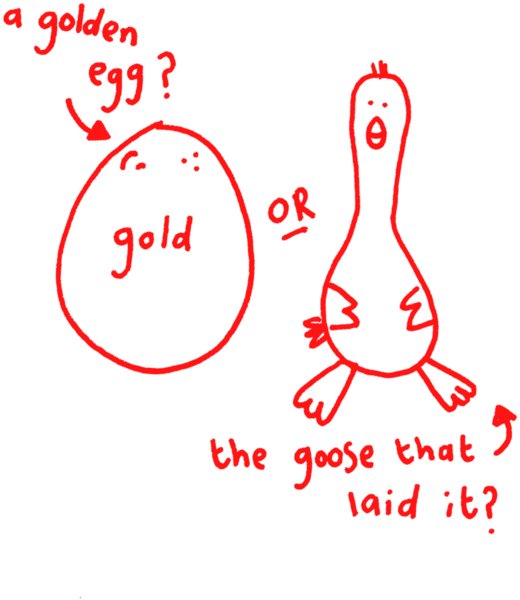
Several eons ago I started one of my books with a personal development question: what would you rather have, a golden egg, or the goose that laid it?
It was my pompous way of suggesting that The Art of Being Brilliant was somehow different to all the other books out there. Looking back, I was tuned into ‘up my own arse FM’. Since then I’ve learned a whole load of stuff, and as a consequence, I’d like to disappear further into the dark crevasses of my nether regions.
This time there’s no messing around. This book has a different starting point. It’s not going to lay the occasional golden egg of personal development wisdom. I’m not even suggesting it’s the goose that lays golden eggs of enlightenment.
I’m going much further by claiming that YOU ARE THE ACTUAL GOOSE!
#honk
That’s quite a bizarre statement so I’ll leave it hanging and return when the haze of understanding has been burned away by the sunshine of enlightenment.
Meantime, let’s go dark. I’m a simple soul. Not simple as in ‘village idiot’ but as in ‘uncomplicated’.
I’ve been off grid for a while. Deep cover. I’ve been inhabiting the murky world of the ‘intellectual dark web’ where academic skulduggery abounds. I’ve had to infiltrate the academic world, play their game, speak their lingo, wear elbow-patched jackets, learn their statistical techniques in order to become accepted as a boffin.
In the dark depths of academia there’s something called the law of parsimony (otherwise known as ‘Occam’s Razor’) which basically means the simplest theory is usually the best. That’s why I love the paradox of Wiki’s first line description: ‘In science, Occam’s razor is used as a heuristic guide in the development of theoretical models, rather than as a rigorous arbiter between candidate models.’
I’ve got no idea what ‘heuristic’ or ‘rigorous arbiter’ mean. In some lip-smackingly perverse twist of academic hokum, someone has managed to describe the science of simplicity in a way that is unfathomable to the masses.
Yet I am the masses. Infiltrating the academic world wasn’t just deep cover, it was head-imploding Marianas Trench depths. For the record, it took me 12 years to get a PhD. I describe myself as a recovering academic. I’ve been coshed in dark doctoral alleyways, assaulted and battered by the big words police.
I’ve wandered down many academic cul-de-sacs that have been interesting dead ends. I’ve discovered stuff that’s insanely attention-grabbing but that hasn’t made the final cut for my Greatest Hits.
For example, statistically speaking, you are more likely to die on the way to buy a lottery ticket than you are to win the lottery itself. Or that it’s physically impossible for a pig to look up at the sky. Did you know that a jiffy is an actual unit of time; 33.3564 picoseconds to be precise (the amount of time it takes light to travel a centimetre) or that all polar bears are left-handed? Every single one of them. I guess that explains why you never see them with scissors?
#Fact: It’s scientifically proven that people who have more birthdays actually live longer. Cows can go upstairs but not downstairs, that’s crazy right? The electric chair was invented by a dentist; no surprises there. Men with a bad sense of smell have small willies. Really? Yep. But that nugget doesn’t make it into this book. Neither does the fact that the happiest temperature is 20°C [68°F], so you’re more likely to find happiness in Manchester than Miami.
Here’s another belter; according to the Journal of the American Medical Association, medical treatment is the third-leading cause of death after heart disease and cancer in the United States. Let that last one settle for a few seconds. Vast numbers of people are dying from medical treatment.
And then there are facts that aren’t facts. Unfacts! The sun rises in the east and sets in the west … not true. The sun isn’t rising and setting, it’s us, the earth, that’s rotating to give the illusion of a rising and setting sun.
I’m giving you these gems as castaways – freebies – things I’ve found along the way but that haven’t made it into this book! I’m tossing them aside to make room for life-enhancing content, academic elixir that’s been filtered through the finest of meshes that extracts the bullshit and psychobabble. I’ve left that sediment for other authors. You’ve spent a tenner on my book. You deserve the purified best.
Here’s one I know you’re going to love: the Dunning–Kruger effect – the phenomenon of less-intelligent people being more confident. Dunning and Kruger were inspired by reports of a criminal who held up banks after covering his face with lemon juice. Why would you do that? Because lemon juice can be used as invisible ink, so he thought his face wouldn’t show up on camera, that’s why.
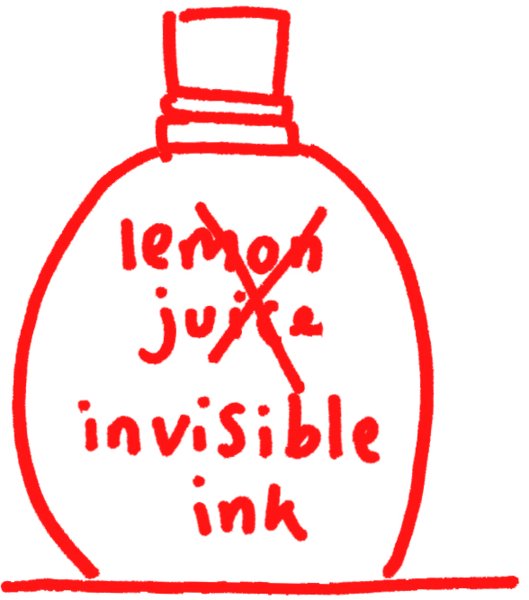
Once again, you might have to let that one sink in for a few seconds.
He actually really thought that.
Dunning–Kruger4 is a re-working of ignorance being bliss. If you don’t know very much, there’s not much to be afraid of.
Sure, I’ve managed to bag myself a PhD but that doesn’t make me a boffin, unless you judge me via Einstein’s definition that genius is 1% inspiration and 99% perspiration. If locking yourself away in a library for 12 years and working yourself beyond the level you were originally designed for is genius, then I will take a bow.
I’ve slogged so you don’t have to. I’m deadly serious about happiness. Yes, ladies and gentlemen, I am indeed a Doctor of Happiness. I wear the Doctor of Happiness masquerade ball costume, but behind the mask it’s just me, a bloke from Derby. Ordinary in every way, and proudly so.
So I’ll end Part 1 with another academic gem. Silvia Bellezza surveyed students to see which university professors they perceived as most intelligent. Her findings? Students rated the bearded and tee-shirted ones as having 14% more brainpower than the clean-shaven shirt and tie ones.5
First up, the bearded thing, I’m assuming it was a study of male professors?
Second, the reason the bearded tee-shirted ones were bestowed with boffin status was because the standard dress code was ‘business’, so smart was the norm. Those who dared to buck the trend gained what are called ‘idiosyncrasy credits’ – a subconscious points allocation from those around you.
This book has been six months in the making. It only took two days to write but the other five months and 29 days were spent waiting for my beard to grow to ‘academic proportions’. I didn’t have time to wait for the Dumbledore look, but I promise you, it’s a decent bird’s nest and is worn with a faded AC/DC tee-shirt.
By Bellezza’s standards, I look proper clever.
Part 1 has been scene setting. Monocle fixed in place, off we trot to Part 2, some science …
